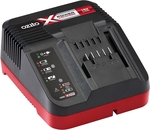Half price on this charger - Credit to pricehipster. This is not a fast charger which will mean the charging times are higher. Fast charger is currently $29.98.
Product Description
This Ozito 18V Standard Charger can be used to charge any battery needed for the Power X Change home and garden range.
Charge Time:
1.5Ah Battery – 60min
2.0Ah Battery – 80min
3.0Ah Battery – 120min
4.0Ah Battery – 160min
5.2Ah Battery – 215min3 stage charge indication
Wall or bench mountable
Provides safe and efficient charging
Suitable for all 18V Power X Change Batteries


Thanks, this will make a nice Kris Kringle gift…